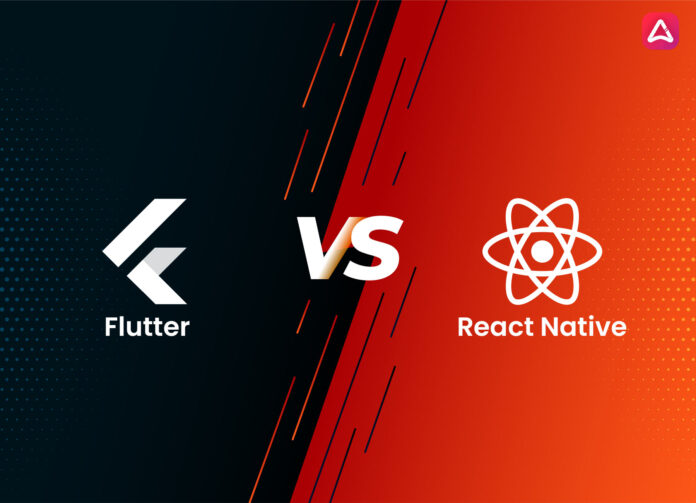As developers, it can often be confusing when it comes to selecting the right app development platform for your project. With so many options available, deciding which framework is best suited to your needs can seem challenging – and this question only increases when considering the two most popular cross-platform frameworks: React native and Flutter. What makes flutter stand out amongst its competition?
In this blog, we’ll look in depth at why developers are increasingly turning to Flutter as a preferred option over React Native for their projects. We will examine advantages in terms of performance and implementation time & more, exploring how the differences between these tools help shape the decision-making process around creating an effective mobile application or website.
Key Differentiators (Flutter Vs React Native)
Many developers have come to prefer Flutter over React Native for a variety of reasons. Here we will explore why Flutter is becoming increasingly popular among mobile app developers.
1. A Comprehensive Solution
One of the main benefits of using Flutter is that it provides a comprehensive solution for creating cross-platform applications. It includes everything from UI elements, animation tools, stateful management, hot reloads, and more. This allows developers to build apps quickly and efficiently without the need for multiple development environments or frameworks.
2. Performance
Performance is an important factor to consider when evaluating any platform for designing and developing apps. In general, most users expect their apps to be responsive and fast-loading regardless of network type. When it comes to performance, Flutter has an edge over react native app development services due to its use of the Dart language, which is compiled ahead-of-time (AOT) and allows for faster execution times than React Native’s JavaScript runtime environment. As well, Flutter apps are built entirely in native code, they are able to take advantage of device hardware components such as sensors or cameras more efficiently than React Native apps.
3. Built-in Widgets
Another advantage of Flutter is that it comes with a variety of built-in widgets. These widgets include Material Design components, Cupertino styles, and many others. This makes creating user interfaces much easier and quicker, as there is no need to create custom components from scratch. What’s more, these widgets are responsive and can be optimized for both Android and iOS devices.
4. Faster Development Cycle
Flutter application development services also offer a faster development cycle than React Native by utilizing its Hot Reload feature. With this feature, developers can make changes to their code and see the results in real-time. This makes it much easier to fix bugs or add new features as they come up, drastically reducing development time.
5. Less Coding Required
Flutter also requires less coding than React Native because of its built-in widgets. By taking advantage of these widgets, developers can create a user interface without having to write extensive amounts of code. This helps reduce development time even further and makes Flutter a more attractive option for those who are looking for an efficient way to develop mobile apps.
Also Read: Flutter App Development
6. Documentation and Support
Finally, Flutter is well supported by both Google and the open source community. There are numerous tutorials and guides available online that can help beginners get started with Flutter. Also, there are active forums where developers can find answers to their questions and get help from other experienced Flutter developers.
To sum up, we now know the importance of Flutter over React Native but be cautious as you must seek assistance from quality Flutter app development services in Canada, USA, UK & other preferred tech hubs for your perfect app execution.
Should You Use React Native?
React Native is a popular platform that can make mobile app development more efficient and cost-effective. With native techniques, it allows for cross-platform experience, which could potentially save both time and money. However, it’s important to keep in mind that with React Native, you need good technical knowledge in order to understand the workings of the system.
Therefore, if you’re considering using React Native for your app development needs, it would be wise to enlist the help of a quality React Native Development Company that have experienced professionals to help you successfully implement the framework.
The expertise at the chosen React Development Company will ensure that your project gets off the ground with minimal complications and achieve maximum efficiency while saving invaluable time and resources.
Also Read: A Complete Guide To Cross-Platform App Development
Final Thoughts
After having gone through the well-researched points made in this post, it should be clear to you why Flutter is a preferred option for developers as compared to React Native. The key advantage that Flutter offers is its cross-platform compatibility, which allows developers to create apps that can be run on multiple platforms with minimal effort. In addition, Flutter also provides a wide range of libraries and tools that make app development simpler and faster.
If you are looking for a reliable partner for your app Development needs, then look no further than AppStudio. They have a team of experienced professionals who know how to get the job done right. In case you are planning to develop a mobile application soon and want an expert opinion on whether React Native or Flutter app development would be a better option for your app, feel free to reach out to them.





